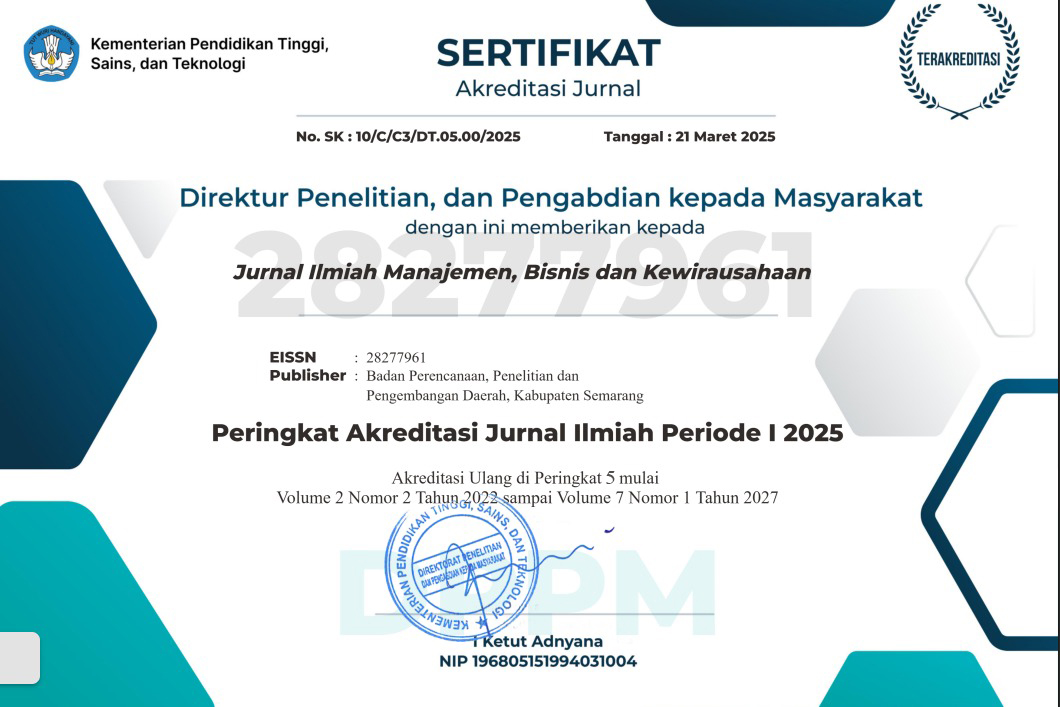Pengaruh Akuntansi Pertanggungjawaban Terhadap Kinerja Karyawan dengan Amanah Sebagai Variabel Moderasi
DOI:
https://doi.org/10.55606/jurimbik.v5i2.1137Keywords:
Accountability Accounting, Employee Performance, TrustAbstract
This research was conducted to determine the effect of accountability accounting on employee performance with trust as a moderating variable at BSI KCP Hangtuah 1in Bengkalis. In this research, researchers used employee performance as a dependent variable to become a benchmark for other variables that will be examined. This research is a descriptive quantitative research that uses primary data in the form of a questionnaire distributed to 18 respondents who were then analyzed using SmartPLS. The research results show that responsibility accounting has an effect on employee performance. And when moderated by mandate, the influence of responsibility accounting on employee performance becomes stronger. This is in line with theory and previous research. What makes the difference is that the existence of the trust variable as a moderating variable greatly influences the strength of the influence of the independent variable. It is hoped that the results of this research can contribute to BSI KCP Hangtuah 1 in improving service quality and employee comfort so that employees feel very comfortable and attached to BSI KCP Hangtuah 1.
References
Anastasia, M., & Anizar, S. (2022). Penerapan Akuntansi Pertanggungjawaban Sosial Corporate Social Responsibility Pada PT. Tarungin Bina Mitra. Owner: Riset Dan Jurnal Akuntansi, 6(3), 2526–2533.
Andriana, D., & Balqis, K. (2015). Peranan Akuntansi Pertanggungjawaban Dalam Kinerja Manajer Pusat Pertanggungjawaban. Jurnal Riset Akuntansi Dan Keuangan Vol, 3(1).
Beekun, R. I., & Badawi, J. A. (2015). Leadership: An Islamic Perspective. Amana Beltsville, MD.
Bernardin, H. J., & Russell, J. E. A. (2017). Human Resource Management: An Experiential Approach. Irwin/McGraw-Hill.
Chowdhury, A., & Shil, N. C. (2020). Conceptualising Management Control Systems: Illustrative Evidence From Literature on The Australian Business Sector. Vezetéstudomány/Budapest Management Review, 51(11), 51–63.
Judge, T. A., & Robbins, S. P. (2017). Essentials of Organizational Behavior (Vol. 3). Pearson Education (us).
Karhapää, S.-J., Savolainen, T., & Malkamäki, K. (2022). Trust and performance: a contextual study of management change in private and public organisation. Baltic Journal of Management, 17(6), 35–51.
Kasmawati, Y. (2017). Human Capital dan Kinerja Karyawan (Suatu Tinjauan Teoritis). JABE (Journal of Applied Business and Economic), 3(4), 265–280.
Kurniawan, I., Triatmanto, B., & Zuhroh, D. (2024). Increasing SME Performance Through Quality Information Technology and Top Management Support. Innovation Business Management and Accounting Journal, 3(1), 63–69. https://doi.org/10.56070/ibmaj.2024.008
Lamere, L., Kirana, K. C., & Welsa, H. (2021). Analisis pengaruh gaya kepemimpinan dan etos kerja terhadap kinerja karyawan melalui motivasi sebagai variabel intervening. Bisma: Jurnal Manajemen, 7(2), 341–349.
Mangkunegara, A. A. A. P. (2019). Manajemen Sumber Daya Manusia Perusahaan. Remaja Rosdakarya.
Mowen, M. M., Hansen, D. R., & Heitger, D. L. (2018). Cornerstones of Managerial Accounting. Nelson Education Ltd.
Niswatun, D. (2025). Pengaruh Gaya Kepemimpinan Islam dan Budaya Organisasi Terhadap Kinerja Pegawai Dengan Motivasi Kerja Sebagai Variabel Moderasi (Studi Pada Pegadaian Syariah di Bandar Lampung). UIN Raden Intan Lampung.
Nurfitriani, M. M. (2022). Manajemen Kinerja Karyawan. Cendekia Publisher.
Purwanti, A., Rikah, R., Sutrisno, C. R., Sartika, D., Syahrenny, N., Mahmudah, D. A., Yani, P., Mulyani, S., Adriyana, R., & Rois, D. I. N. (2024). Sistem Akuntansi. Eureka Media Aksara.
Rivai, V. (2018). Manajemen Sumber Daya Manusia untuk Perusahaan. Rajawali Pers.
Shuhari, M. H., & Hamat, M. F. (2015). Nilai-Nilai Penting Individu Muslim Menurut Al-Ghazali. Jurnal Islam Dan Masyarakat Kontemporari, 9, 41.
Silaen, N. R., Syamsuriansyah, S., Chairunnisah, R., Sari, M. R., Mahriani, E., Tanjung, R., Triwardhani, D., Haerany, A., Masyruroh, A., Satriawan, D. G., & others. (2021). Kinerja Karyawan.
Sumantari, N. W. D., & Juliarsa, G. (2023). Efektivitas Sistem Informasi Akuntansi, Budaya Organisasi dan Kinerja Karyawan dengan Insentif dan Motivasi sebagai Variabel Moderasi. E-Jurnal Akuntansi, 33(2), 377. https://doi.org/10.24843/EJA.2023.v33.i02.p07
Wahbah al-Zuhaili. (1998). Usul al-Fiqh al-Islami. Dar al-Fikr.
Yunita, C. (2020). Pengaruh Partisipasi Anggaran, Akuntansi Pertanggungjawaban, Job Relevant Information, Akuntabilitas Publik, Dan Kejelasan Sasaran Anggaran Terhadap Kinerja Manajerial (Studi Empiris Pada OPD Kabupaten Magelang). Skripsi, Universitas Muhammadiyah Magelang.
Downloads
Published
How to Cite
Issue
Section
License
Copyright (c) 2025 Jurnal Ilmiah Manajemen, Bisnis dan Kewirausahaan

This work is licensed under a Creative Commons Attribution-ShareAlike 4.0 International License.










